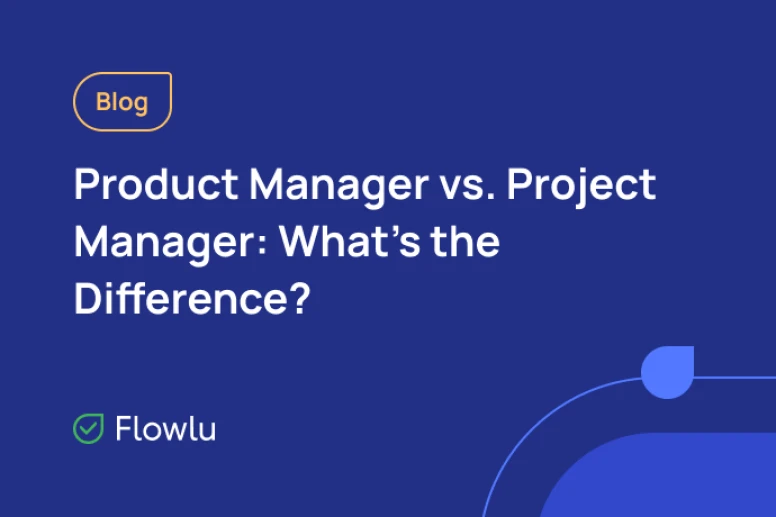The Difference Between Product Manager and Project Manager
Their functions might appear to be the same, even for people with some experience in project development, but it’s wrong. That’s why we need to figure out their differences, roles and responsibilities.
What is a Product Manager?
The product manager defines the whole product vision, as the product owner does. To be a product manager, it’s essential to have a broad overview of the market your product is going to be involved in.
Product managers’ job is to regularly perform research and make sure that the product meets the customer’s needs. Furthermore, an analytical mindset is necessary for a manager because each action in product development has to be based on specific metrics.
In some cases, the product manager is also the product owner, who provides full immersion in the workflow. To meet customers’ needs, a product manager has to build strong communication with clients and users. It requires a deep understanding of design, data analysis, and development.
To deliver the correct vision of a product, customer support skills are also a part of the product manager’s toolset. Speaking of a toolset, there are not just skills that product managers must have, but some talents as well. For example, a bit of intuition might help to define the best path. But anyway, understanding of key metrics and customer needs are the most important qualities for each product manager.
If you’re on the path to becoming a product manager, the result of your work has to be a brainchild of yours. You have to clearly realize what your product is, who needs it, and what the results should be.
What Does a Product Manager Do?
As a product manager builds the strategy, most of the tasks are analytical and based on gathered data. To make it simple, it’s better to imagine the complete workflow and define each step of a product manager.
- Coming up with an idea. First of all, the product manager has to be involved in the drafting process. It’s important because the product manager will be creating the full picture of a product, from its design to deployment. That’s why he has to have a full grasp of how it’s going to be.
- Data and feedback gathering. Before starting product development, he has to consider all the risks. That’s why all decisions have to be related to the gathered data. A product manager performs surveys, conducts research and meetings with stakeholders to understand their expectations.
- Roadmap development. The mission of a product manager lies in defining the path of a project as well. He has to realize all potential problems and stumbling blocks to prevent or avoid them with less waste. Moreover, product managers establish priorities for the tasks and can pre-define future steps.
- Market analysis. Even if pre-deployment research is vital, a product manager has to conduct such analysis all the time to stay up-to-date.
- Backlog creation. As a product manager organizes all the steps of product development, the backlog consists of the list of future launches, updates and issues that have to be resolved. Simply put, a backlog is the roadmap created by a product manager for the development team, but it will change over time.
- Customer support and update prioritization. To provide better results, a product manager has to be on good terms with customers and clients. Their needs can change, that’s why it’s important to regularly check if they’re still satisfied with your product and what has to be done to deliver better outcomes.
The tasks of a product manager can vary depending on the product’s lifecycle, and he’s involved in communication with departments like marketing, development, technical support, sales, design and others. Anyway, a product manager doesn’t need to be an expert in each of these fields, but he has to clearly understand the value of the product and how to promote it.
What is a Project Manager?
While project managers’ roles are mostly strategic and tactical, they take part in the project from its beginning, starting with a brainstorming to come up with the idea of a project. Their field lies in monitoring the project on its path and making sure that the staff is doing everything in time and according to the project scope.
In fact, a project manager is the one who defines the project scope and charter. As it was said, a project manager has to observe the whole situation on the project. It requires some experience, and that’s why he has to be an expert in the industry he works in.
Sounds a little bit similar to the product manager, don’t you think so? But it’s not, because while the product manager is focusing on the strategy and product appearance, the project manager has to put everything together and coordinate the work of a team. Since a product manager defines work structure breakdown, a project manager comes up with the most profitable way of project embodiment.
A project manager, as a product manager, has to constantly communicate with other departments. As the main task is to support the project from its beginning to the final stage, a project manager has to have the ability to overcome problems and challenges. If some issues are predefined by a product manager, a project manager has to find a way to solve them and keep the workflow smooth.
It’s vital to be flexible and stress-resistant, because the project manager is the one who has to keep all deadlines and adjust project stages to an always-changing situation. And as being project managers is not simple, they have to stay on budget and avoid redundant expenses.
What Does a Project Manager Do?
A project manager takes part in planning, implementation, stakeholder management, and communication within departments. In that case, the project manager follows the goals below:
- Communication with each department’s team. There are a lot of activities that have to be done for each project. That’s why the project manager has to coordinate their activities to avoid misunderstandings and deliver the profit.
- Implementing project management methods. To save resources and get better outcomes, a project manager has to implement tools from methodologies like Agile, Scrum, Critical Chain and others. Such methods will help to accurately track each task and to control outcomes.
- Task tracking and delegating. A project manager is responsible for task management, because it has to be assigned to the right person and finished in time. In that case, the project manager’s mission is to find a proper performer.
- Observe business objectives and track KPIs. As it’s essential for each project to meet deadlines, the project manager has to observe each stage of a project and find weak spots.
- Communication and management of stakeholders. If the product manager is responsible for defining the product’s value, the project manager has to communicate with stakeholders to deliver results. But it’s important to keep in mind that stakeholders are not just clients and customers, but your team, board of directors and other cohorts of people as well. To find the full definition of what is a stakeholder, you can check out our recent article.
- Establishing and keeping timeframes. It’s vital to deliver outcomes on time. That’s why project managers establish timeframes and look for their following. Managers who’re using flexible methodologies usually break the project into stages.
In practice, project managers are responsible for deadlines, task management, communication with the team and stakeholders, and progress tracking as well.
Product Manager vs. Project Manager: Do You Need Them Both?
Each project needs both product and project management, but do you need two different people for each of these tasks?
As a product manager mostly covers up strategy and theoretical points, it has to be a certain assignee to play such a role. When the strategy is defined, all it takes is to make everything work together. But is it so easy?
Project managers can’t be completely removed or replaced by another expert, but there are some tools that can help to manage projects more effectively and in less time .
Kanban Board
Since it’s a responsibility of a project manager to track the course of the project, it’s handy to visualize everything, so here is a Kanban board to help you. Each task is divided into a few columns, which you can set up manually. With a Kanban board, project tracking becomes smooth and clear, so you don’t have to spend time monitoring each employee, while it’s the whole project overview on your hand.
Project Workflows
With Flowlu, you can create templates of workflows, so you don’t have to set up an all-new work breakdown structure for each project. By setting up and reaching milestones, a project manager can accurately estimate the progress of each stage.
Communication Tools
Communication with teams of different departments is one of the main tasks for each project manager, so with Flowlu, you can separate conversations by projects and create group project chats. Moreover, you can use comment sections on the project page and give access to the team or even to your client, so you can stay in touch with the product owner.
Reports
In Flowlu, each project is powered by a reporting module. You can keep track of finances, task completion, issues, and team performance. Also, you can set up custom lists to track fields that need to be personally observed.
Final Words
The difference between a product and a project manager is reasonable. While a product manager builds the strategy of the product development, brings value and defines the path to customers, a project manager puts it into practice.
But since the job of a project manager is mostly technical, he still can’t be replaced by other specialists in general. Anyway, some of the project management tasks can be facilitated by dedicated software like Flowlu to accurately track project progress, build strong communication within departments and clients.
A Product Manager focuses on defining the product vision, strategy, and customer needs, overseeing the product from conception through launch and beyond. They're involved in market research, product vision, and customer interaction. In contrast, a Project Manager is responsible for the tactical aspects of a project, such as planning, execution, and meeting deadlines, ensuring the project aligns with the initial scope and is completed on time and within budget.
A Product Manager needs a broad set of skills, including a deep understanding of the market and customer needs, analytical abilities to base decisions on metrics, strong communication skills for interacting with clients and users, and an understanding of design, data analysis, and development. They also need to be able to deliver a clear vision of the product and have some intuition for making strategic decisions.
The key responsibilities of a Project Manager include planning and overseeing the project to ensure it is completed in a timely fashion and within budget, managing team coordination and communication, implementing project management methodologies to optimize efficiency, task delegation, tracking business objectives and KPIs, managing stakeholder communication, and ensuring project milestones are met according to established timeframes.











